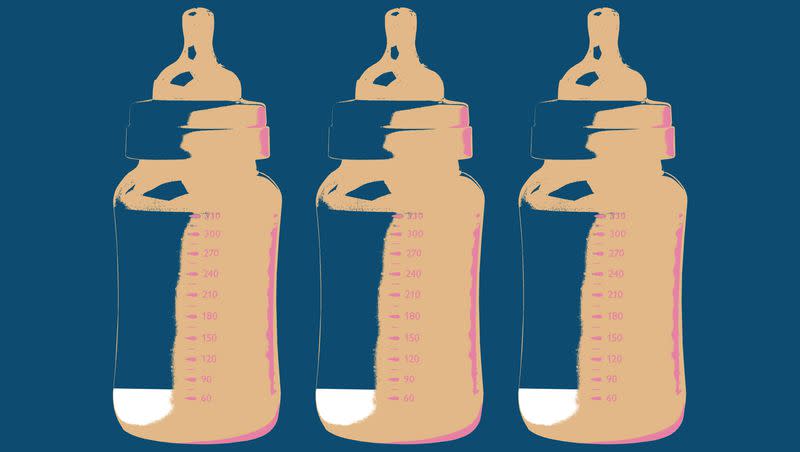Is new baby formula shortage coming — and how would Sen. Mike Lee head it off?

- Oops!Something went wrong.Please try again later.
For parents who scrambled for months to secure an adequate supply of infant formula to feed their babies and special needs children, the formula shortage remains vivid, though the supply has largely returned to normal.
But some believe another formula shortage could be quietly brewing, spurred in part by production challenges that three formula manufacturers have faced recently that could pinch the formula supply if not adequately and swiftly resolved.
The U.S. Food and Drug Administration recently sent warning letters to ByHeart Inc., Reckitt/Mead Johnson Nutrition, and Perrigo Wisconsin that outline shortfalls in how all three handle potential contamination and gave the formula makers a short timeline to respond. Additionally, one of Reckitt’s plants also didn’t make sure that the equipment and utensils used are of “appropriate design and were installed to facilitate their intended function and their cleaning and maintenance.”
Utah’s senior senator, Republican Mike Lee, believes a long-term fix is needed to make it easier to import infant formula from elsewhere if the need arises. He touts his Formula 3.0 Act, cosponsored by a bipartisan group of his colleagues, noting it would boost the formula supply and also reduce the cost.
“The welfare of our families, especially our infants, is of utmost importance,” Lee told the Deseret News on Wednesday. “The formula shortage has highlighted the need for long-term solutions that promote accessibility and affordability. With the Formula 3.0 Act, we take a significant step towards permanently eliminating trade barriers and ensuring a stable supply of infant formula for families across the nation.” He posted a similar message on X (formerly Twitter) this week as well.
He’s not alone in being concerned.
On Tuesday, U.S. Sens. Bob Casey, D-Pa., Sherrod Brown, D-Ohio, and Martin Heinrich, D-N.M., sent a letter to FDA Commissioner Robert Califf asking the agency to be proactive in preventing future formula shortages and making certain that domestically produced formula is readily available and store shelves stocked as the manufacturing infrastructure is improved.
As Reason.com pointed out, the warning letters from the FDA to the formula manufacturers “indicate that another formula crisis should soon be underway. Just four companies — including Mead Johnson and Perrigo — comprise 90% of the U.S. baby formula market, meaning that if just one factory is forced to stop production due to safety concerns, it could send a massive shock to the U.S. formula supply, creating a repeat of last year’s baby formula shortage, which the Deseret News covered extensively.
Preventing another shortage
The Formula 3.0 Act is sponsored by Lee, Sen. Bob Menendez, D-N.J., and Reps. Adrian Smith, R-Neb., and Don Beyer, D-Va. The bill would dump the high tariffs on imported baby formula permanently. It would also help families whose babies use specialty formulas made in Europe. Children with certain medical conditions and allergies have very particular formula needs.
Related
“The fragility of the domestic infant formula market was put into stark relief last year when a problem at just one company’s facility led to a drastic supply shortage and massive price increases for parents nationwide,” Beyer said in a June press release. “... This bill would permanently eliminate trade barriers to encourage the import of FDA-compliant infant formula, bringing prices down for parents in the near term and staving off a potential future crisis.”
Lee has said the bill will make the formula supply stable and accessible.
The letter from Casey, Brown and Heinrich acknowledged the work the FDA has done to boost manufacturing infrastructure, including increasing inspections and ordering improvements to the factories.
The letter also posed questions, including how the FDA will ensure a stable supply of formula, how the administration is monitoring for potential production slowdowns, how it’s working with formula producers to make sure enough formula is produced to meet demand, and how the FDA would prepare to keep formula available should there be a government shutdown, among other questions.
They closed the letter with a request for a swift response.
A bit of history
Infant formula had begun to disappear from store shelves in February 2022, the shortage spurred by a large formula recall by Abbott Nutrition, supply chain problems and panic buying as parents began to notice blank spots on the shelves. The shortage was exacerbated by the temporary shuttering of Abbott’s largest manufacturing plant, located in Sturgis, Michigan, to address safety and contamination worries.
In the months that followed, as families searched for elusive formula and recruited others to help them find it — especially worrisome because some babies require highly specialized hypoallergenic products — the Biden administration loosened restrictions on importing formula from other countries. Lee introduced an earlier formula bill. Tons of formula was airlifted in from overseas. The Defense Production Act was used to divert resources to formula manufacturing. And other measures were taken. Gradually, the supply of formula stabilized. But no one declared it rock solid.
The FDA eased its importation rules so that foreign manufacturers can sell their formula in the United States if they meet certain requirements. And Congress temporarily waived the 27% tariff on foreign-made formula, but that was reinstated at the end of the year and imports began to decrease again. Reason.com says store shelves are no longer as well stocked, either, as a result, though the situation is not at this point serious.
But critics say Congress hasn’t done anything recently to prevent what they see as a potentially looming crisis.

